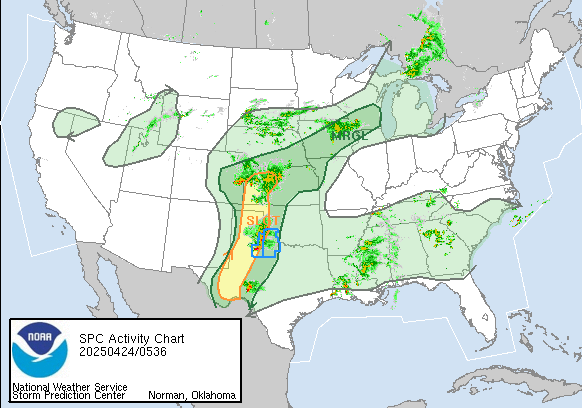SPC AC 231251
Day 1 Convective Outlook
NWS Storm Prediction Center Norman OK
0651 AM CST Mon Feb 23 2026
Valid 231300Z - 241200Z
...NO THUNDERSTORM AREAS FORECAST...
...SUMMARY...
Thunderstorms are not expected today or tonight.
...Discussion...
Convective potential will be virtually nil today. While isolated
lightning flashes were noted overnight east of Long Island and near
coastal southern New England, lightning-conducive thermodynamic
profiles, in the northwest quadrant of the deep offshore cyclone,
will continue to quickly diminish and shift away from the coast. In
the Pacific Northwest, a few lightning flashes occurred overnight in
coastal Washington, and a sliver of weak buoyancy was observed in
the 12z UIL/Quillayute, WA sounding. However, a trend toward
shortwave ridging and less-lightning-conducive thermodynamic
profiles should effectively end such thunderstorm potential.
..Guyer/Grams.. 02/23/2026
NOTE: THE NEXT DAY 1 OUTLOOK IS SCHEDULED BY 1630Z
SPC AC 230621
Day 2 Convective Outlook
NWS Storm Prediction Center Norman OK
1221 AM CST Mon Feb 23 2026
Valid 241200Z - 251200Z
...NO THUNDERSTORM AREAS FORECAST...
...SUMMARY...
Thunderstorms are not expected across the US on Tuesday.
... Discussion ...
Fast, broad northwest flow will be in place across much of the US
upper-levels on Tuesday. Embedded within this flow, a strong
shortwave trough will move from the Northern Plains into the Great
Lakes. At the surface, a low will skirt the central US-Canada
border, ending up north of the Great Lakes. Despite impressive
kinematics associated with this trough/cyclone, limited moisture and
instability should preclude thunderstorm development.
A secondary low will develop southward from eastern Colorado into
Northwest Texas, within a broad lee trough stretching from north of
Montana southward into central Texas. This low will begin drawing
Gulf moisture northward into the central US. However, the lack of
focused surface convergence/large-scale ascent should preclude
precipitation/thunderstorms from developing on Tuesday.
Across the West, a strong atmospheric river will take aim across
portions of the Pacific Northwest into northern California as an
extremely positively tilted trough moves into the Pacific Northwest.
Forecast soundings across the area denote nearly saturated, moist
adiabatic temperature/dewpoint profiles, which should inhibit
sufficient instability for thunderstorm development.
..Marsh.. 02/23/2026
WUUS02 PTSDY2
SPC AC 230752
Day 3 Convective Outlook
NWS Storm Prediction Center Norman OK
0152 AM CST Mon Feb 23 2026
Valid 251200Z - 261200Z
...NO SEVERE THUNDERSTORM AREAS FORECAST...
...SUMMARY...
Thunderstorms will be possible late Wednesday night into early
Thursday morning across portions of the Ozarks east into the
Tennessee Valley.
... Discussion ...
A fast moving, positively tilted shortwave trough embedded in the
broad northwest flow across the US will move from the Interior
Pacific Northwest to Iowa/Missouri during the forecast period. At
the surface, southerly winds to the east of a broad lee trough will
begin drawing warm air and Gulf moisture northward through the day
on Wednesday, ultimately aiding the development of a
northwest-to-southeast oriented warm front stretching from Nebraska
to Alabama/Georgia.
In response to the approaching shortwave trough, southwesterly
low-level winds will strengthen across Texas into the Ohio Valley
overnight Wednesday into Thursday. Precipitation will likely develop
in response to this increasing moist isentropic ascent. Forecast
soundings from the Ozarks into the Tennessee Valley indicate
sufficient moistening just above the boundary layer to support up to
500 J/kg of elevated instability and the potential for a few
thunderstorms. As of now, the weak instability should limit any
severe threat with these elevated storms.
..Marsh.. 02/23/2026
WUUS03 PTSDY3
NOTE: THE NEXT DAY 3 OUTLOOK IS SCHEDULED BY 1930Z
|






